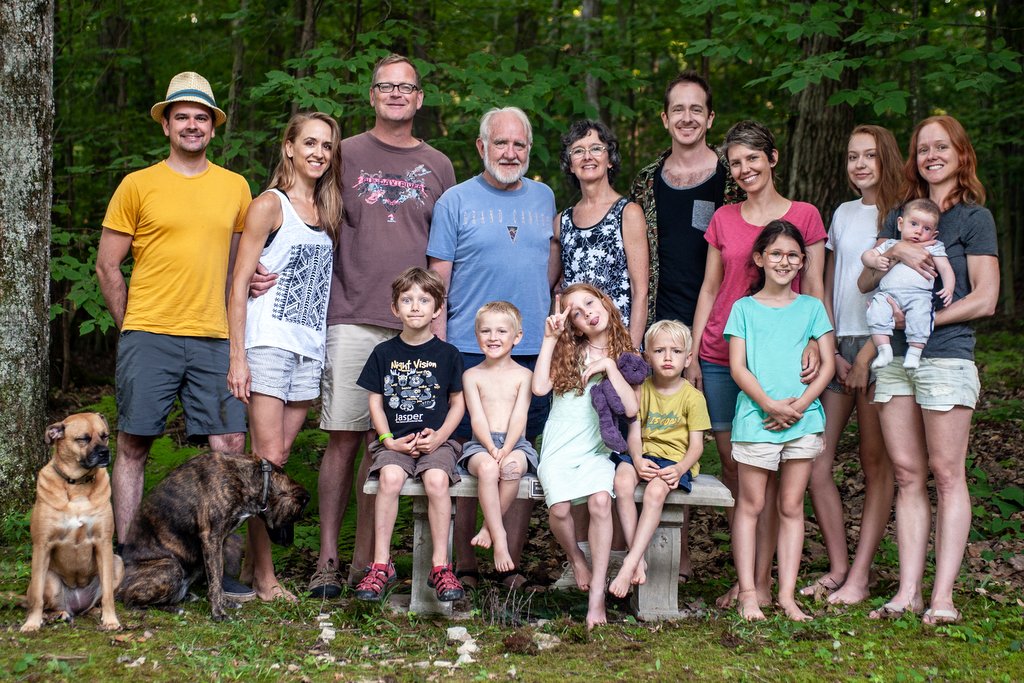Author/Compiler’s Brief Autobiography
In the Beginning
I was conceived in June 1942, about six months after Pearl Harbor was attacked by the Japanese on December 7, 1941. My parents were deeply in love and remained totally committed to each other to their natural deaths nearly 60 years later. However, human love can run ahead of God’s timing, which led my parents to get married in a lovely ceremony in Andover, Massachusetts a few months after my Psalm 51:5 conception. They moved to Boston near MIT where my dad was re-enrolling in an engineering program. Unfortunately, it was in a different draft district and within weeks he was drafted into the Army and sent for basic training in preparation for serving in World War II. My mother moved to Ohio to live with an older sister and family during her pregnancy, and I was delivered at term in Akron on March 13, 1943, weighing 10 pounds and 6 ounces!
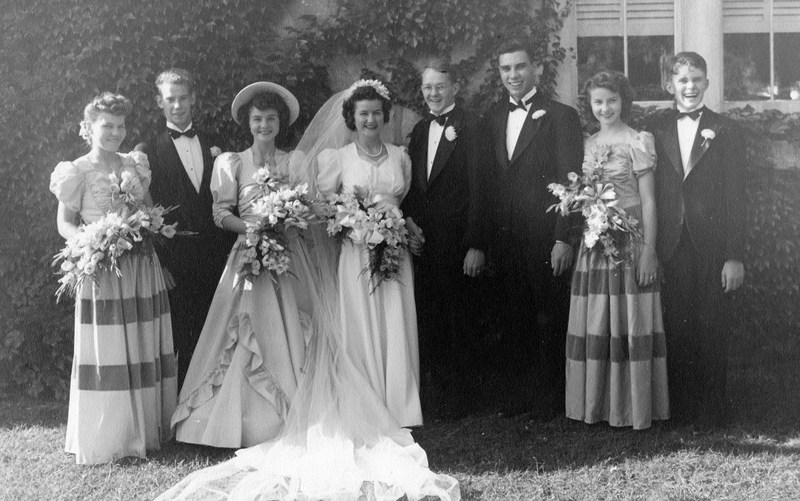
Little Billy
The first time that I met my father was that summer when I was six months old, shortly before he was shipped overseas. It was a very emotional experience that remains branded into my memory to this very day. I have vivid, virtually photographic, memories of the house in which we were living at the time, where the furniture was located, what the yard and grounds looked like, and the events of my father’s visit. Family members have always been amazed at how much I remembered at such an early age.
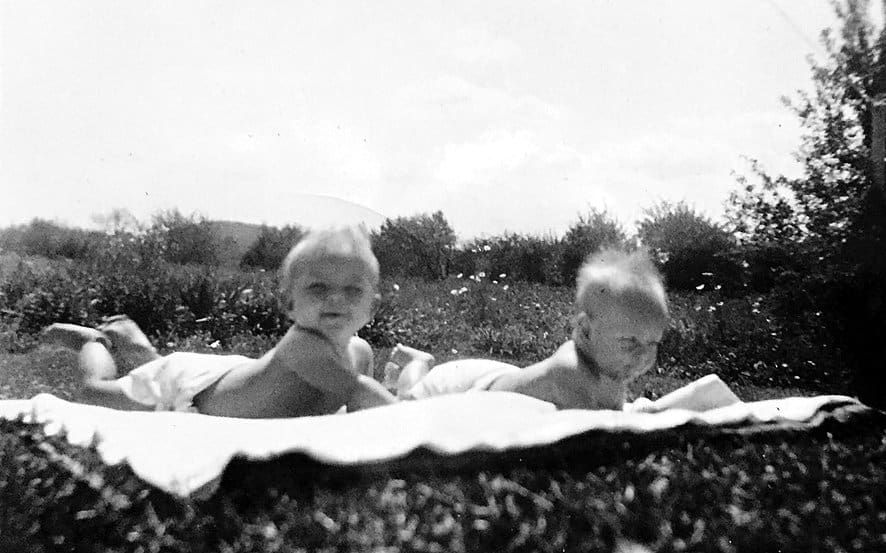
Billy and Ruthie enjoying the summer sun in 1943
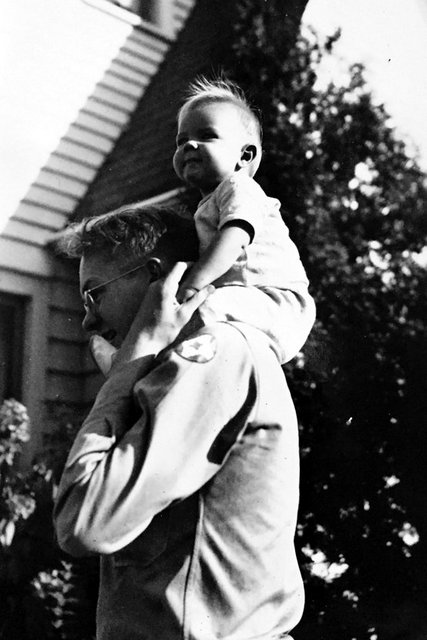
My mother and I lived together with her sister and my cousin Ruth, who had been born the week after me, and then my mother got a job in a nearby town and we moved to an apartment together where we stayed until shortly before the end of World War II when my mother moved back to Massachusetts to be near family. Within months of moving back East she and I were able to welcome my dad home as he was discharged from the United States Army in December 1945. I was almost 3 at the time and I vividly remember riding in the back of a car in the dark of night to the discharge facility and being part of the greeting we shared when he walked toward us and embraced us. Very shortly afterward, we moved back to the Boston area again where my dad, supported by the GI Bill, re-enrolled at MIT. Nine months later my sister Gail was born, a delightfully joyful event for everyone in our extended family but one that left me somewhat bewildered since I had been the number one guy in my mother’s life for so long that sharing her with my father and now a new baby sister was a challenge for me. As a result I became a little bit more aloof and somewhat of a loner who learned how to take care of myself and keep myself occupied and entertained pretty well, skills that have served me over the years, with some downsides.
Grade School Years
The following year when I was 4 1/2 I had made several friends in the neighborhood that were older than me and were heading off to Kindergarten in the fall. This was going to leave me without friends during the day, so my folks arranged for me to be able to go to Kindergarten with them. I was a bright little boy and did very well, well enough that in January I was promoted to the first grade before even turning five. The fun of Kindergarten was over, and I found the academic work of reading, writing, and arithmetic at the first grade level to be tiresome. I was able to do the work but felt a lot of stress being the youngest and smallest fellow in the class. At the end of that semester in June my teachers were going to move me on to the second grade in the fall even though I had just turned five. Fortunately, my father had graduated from MIT and gotten a job in New Britain, Connecticut, so we moved that summer and my folks enrolled me in Kindergarten again that fall. It was wonderful! I enjoyed the whole year, singing songs, playing with blocks, going out to the playground for recess, and having the teacher read stories to us. it was in my second Kindergarten that I learned to really love school and learning, a love that I have never lost.
Throughout grade school my father went from one new job and promotion to another as part of the upwardly mobile American dream they were pursuing, which meant moving from one city to another frequently for his different job locations. Sometimes the moves we made as a family had to do with where there was available housing nearby my dad’s new job. To give you one example, in the fifth grade I went to three different schools in three different towns, even though my dad’s job stayed the same. At each new place I was enrolled in a different school and found new friends. What I learned was that many things in life are not permanent but Family is. I also learned how to make new friends quickly and then to let go when I had to leave. These skills or adaptations have been a mixed blessing and curse that have allowed me to get close to people very quickly but also be prepared to let go of them at short notice.
Onward to High School and Andover
I enjoyed my grade school studies and my classmates. Wherever we lived, we found a new church somewhere in the mainline Protestant camp. This was the post-war 1950s where ads through the new medium of TV announced frequently that “the family that prays together, stays together.” I remember singing “Jesus loves me, this I know, for the Bible tells me so” in a Presbyterian Sunday school class while I was in the third grade. I participated in a rural Methodist church revival meeting in the fifth grade and almost went forward for the altar call. I enjoyed individual activities like camping and some team activities and sports like Cub Scouts, Boy Scouts, and Little League. I moved easily through middle school into a central high school high in our area in Upstate New York. I served as an altar boy and became part of our Episcopal Church youth group where I rose to leadership in our local Diocese. I enjoyed going to church camp where we engaged in wholesome activities and sang songs like “Kum ba yah” and scout camp where we kept active outdoors, swam and paddled canoes, did target practice and crafts, and worked on our merit badges. I thought of myself as a “good” boy and was proud of my status as an Order of the Arrow scout on the way to Eagle Scout status.
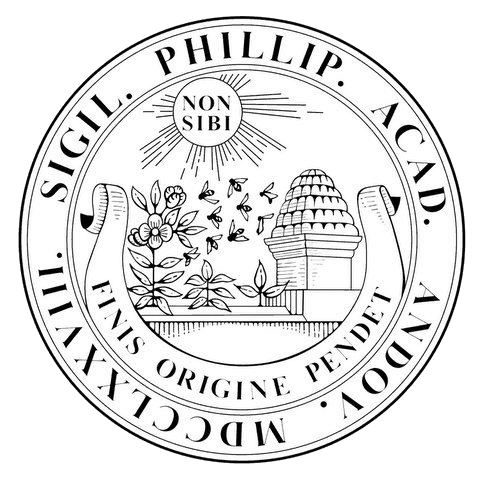
In high school I stood out as a very bright student, especially in the sciences but also in the social studies and English. It was always my intention to go straight from high school to college. However, there was a long-held dream in the back of my mother’s mind that was yet to be revealed. She had met my father while she was living in Andover, Massachusetts and working after high school in the admissions office at Phillips Academy, Andover, a prestigious 9-12 prep school in town. My father lived in the adjacent community of Lawrence, Massachusetts and they had met each other through doing outdoor activities like hiking and skiing together.
My mother had always dreamed that she would have a son who would go to Andover, a dream that I didn’t know about until the summer of my high school junior year when we visited my parents’ old hometowns in Massachusetts. While we were there my mother suggested that we just stop by the Andover campus so she could show us where she used to work.
As it turned out there was a woman in the admissions office who had worked with her in the same office nearly 20 years before. My mother was prompted to ask her, “Do you think there’s any chance that our son might be able to go to Andover?” Her friend asked if I was a very good student, and since I was she suggested that I might interview right then and there because the office happened to be quite quiet at the time. Before I knew what was happening I was ushered into an interview with the admissions officer, and after about 45 minutes of conversation he said, “I think you would be an ideal student for our campus. We have some wonderful scholarship programs, and if your academic record is as good as you say it is we will admit you into the fall class. Just fill out these papers and application and send your high school transcript to us, and if it all looks good we will look forward to seeing you in September.” That’s how I ended up going to Andover for my last two years of high school, delivering packages around the campus as part of my tuition support, and serving as an altar boy at the local Episcopal Church down the street.
College Life and Beyond
After admission to Andover, where I was a somewhat lonely but dedicated student, there were a few twists and turns along the way to college that involved my getting sick with mononucleosis my senior year, spending a few months back home at Utica free Academy, and then excelling for a semester at Clarkson College in engineering before enrolling at Brown University in the second semester of my freshman year. My first college year was spent studying engineering, which was my father’s field of interest. I did very well in my studies but found that my heart was not as much into mechanical things as I had thought, so the second year I transferred to a liberal arts curriculum and studied sociology, psychology, chemistry, and the life sciences. I discovered that I loved biology and living things so I changed my major to biology and began orienting myself toward becoming a research biologist in marine biology. As I grew in my college studies, embraced evolution, and met other students from a variety of ethnic and cultural backgrounds, I became skeptical of my Christian upbringing. It seemed that the world was filled with a fascinating diversity that spoke of something bigger than Christianity. Could it be that “God” was behind all the religions of the world and that good people in all kinds of cultures had had glimpses of “God” similar to those in the proverbial story of the blind men describing their experiences of feeling around an elephant. Perhaps if I could synthesize all of the different religions and accept as “truth” those areas where they agree, I would be closer to something solid. Jesus had to be turned into just a moral teacher to fit my new scheme, and perhaps a failed revolutionary…
During my Junior year at Brown I lived off campus in a small walk up apartment with my friend Earl, a senior, who applied for and was accepted at New York University in an MD/PhD program. Earl came back in September after spending a month in medical school and told me enthusiastically, “Bill, you would love medical school!” He urged me to take the MCAT examinations which I was able to do it in October, and I did so well on the exams that I decided to pursue admission to both medical school and/or research biology programs.
When I went to a school to interview, instead of having the medical professors interview me, I interviewed them by basically asking the question, “Why do you think I would do better going to medical school than becoming a research biologist?” This was a turnaround for them, which they all found to be very stimulating and amusing. Needless to say I was accepted into medical school and found myself driving down from Providence, Rhode Island to Lexington, Kentucky in the summer of 1966 after graduating from Brown and setting up in an apartment across the street from the University of Kentucky Medical Center. I got a job as a motorcycle mechanic for large bore British motorcycles, I hobby that I had been pursuing with my own BSAs and Royal Enfield bikes, and entered medical school in the fall while continuing to work on motorcycles on the side to help with my finances. Church was gone from my activities.
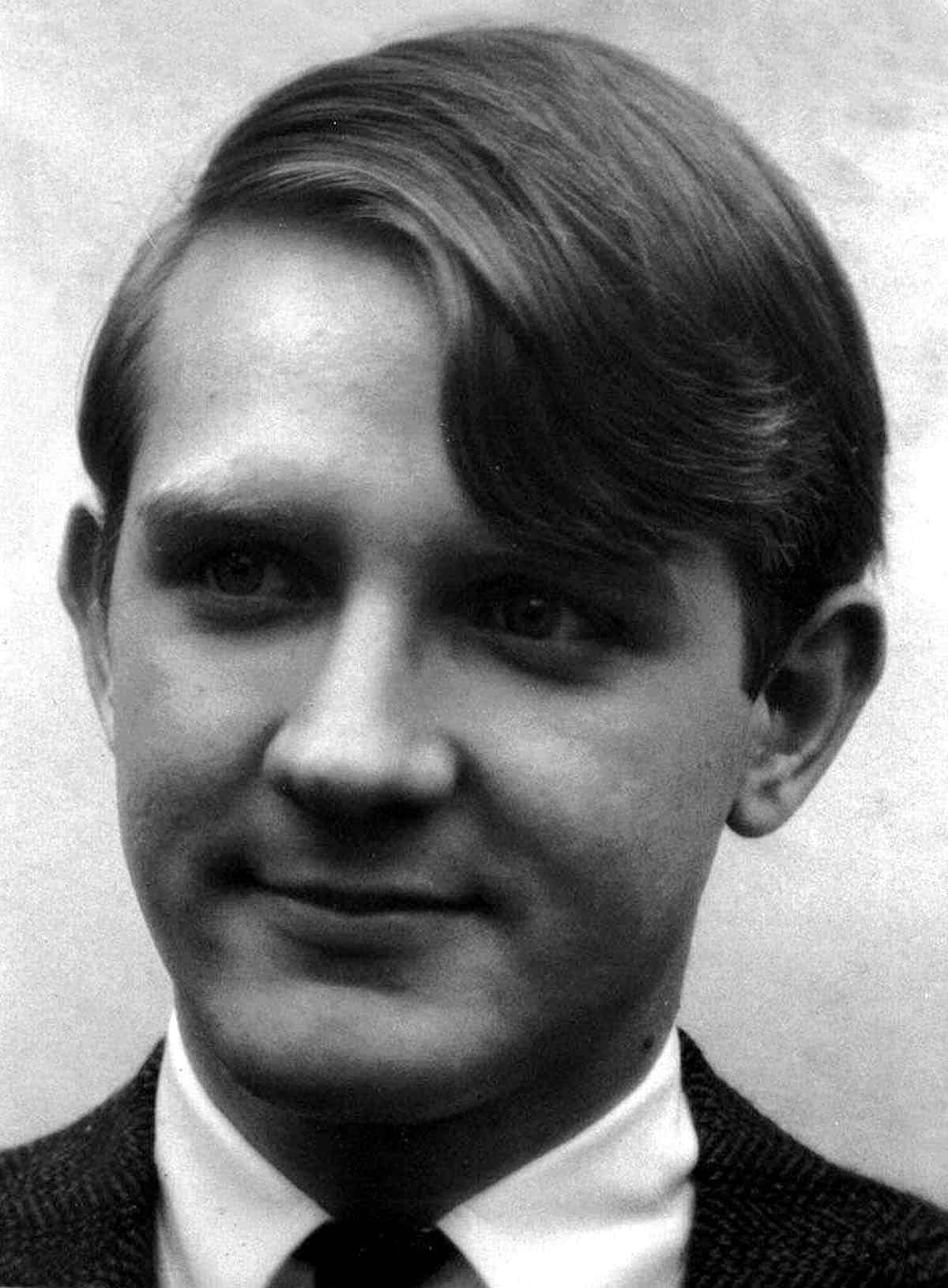
Changes During Medical Training
I enjoyed medical school very much as well as my new BMW R75 motorcycle, camping, canoeing, and general outdoor activities. In the summer after my third year in medical school I did a human genetics research fellowship in Rochester, New York and took an interest in primary care. I had decided that I wanted to become a “real doctor” and take care of whole families in the community. The University of Rochester was one of three schools that were developing a new specialty at the time called Family Medicine, which offered advanced training for people who wanted to specialize in what had been known up until that time as General Practice. GPs would complete medical school and do a one-year clinical internship before going out into practice as unspecialized physicians. On the other hand, Family Physicians would receive three years of specialty training after medical school even though they were seeing the same range of patients that GPs were seeing.
As I approached completing my medical school training, the culture in the United States was in a major social transition. This was the 1960s, a time of a revolution in social mores having to do with sexuality and politics. I became enamored of rock music, new age philosophies, and things that were associated with what would be called the hippie lifestyle. My motorcycle, politics, and friends fit right in. Coming from a conservative background, I maintained a number of conservative perspectives but became quite liberal in many others. When I applied for residency programs I was very enthused about the program in Rochester, New York and gained admittance there, where I also fit right in. Over the three years of my residency I maintained my anti-establishment hippie personality but developed a deep interest in social issues focusing more and more on the problems of poverty, social marginalization, and criminal justice and the prison system.
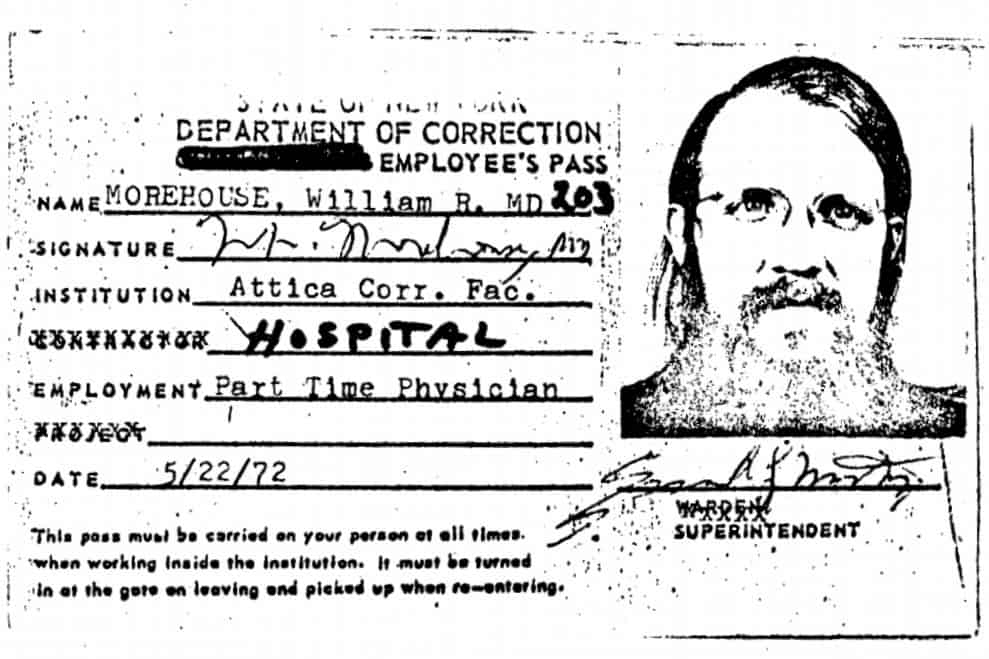
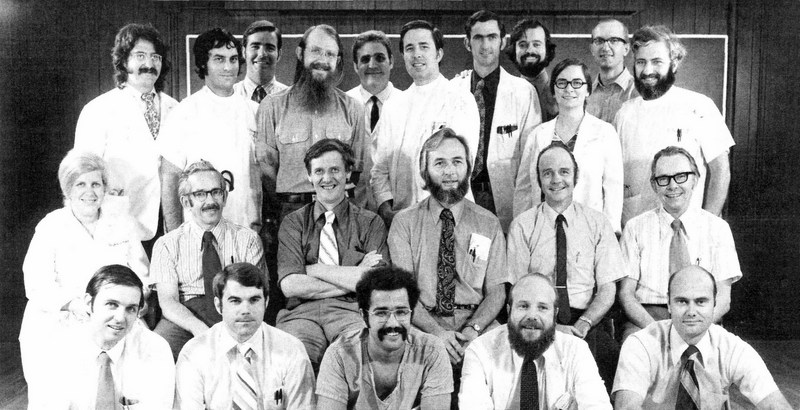
In 1971 there was a major riot at the Attica Correctional Facility, a maximum-security prison about an hour south of Rochester. A residency colleague of mine and I took a serious interest in studying the situation that led up to the riot from a medical perspective to see whether or not inadequate medical care, which was one of the inmates’ primary complaints, was really a problem and if so what could be done about it.
The system at Attica that we found was truly deficient in attitude, staffing, organization, and quality. It looked to us like a holdover from a previous era that had virtually no relationship to the contemporary approach to medical care that we were being trained in. I submitted a proposal to the New York State Department of Corrections which outlined a complete revamping of their medical care system and offered myself as a residency-trained primary care specialist to become the new prison Medical Director to initiate and establish the program. This was toward the close of my medical residency, and I had received some encouraging communications as I waited hopefully for my proposal to be accepted.
Community Doctor on a Spiritual Journey
When I instead received a rejection letter from Albany in June 1973, just weeks before I was to complete my residency, I found myself suddenly cast into a very unusual frame of mind in which my perspective became extremely mystical and global, a mysterious blend of interfaith perceptions colored by my Christian upbringing and sincere good will. I spent nearly 2 weeks gathering together a lengthy and rather artistically poetic approach to documenting the experience that I had had with the proposal and the Attica Correctional Facility which took the form of a 3-volume treatise I titled Hydra. After rapidly producing and distributing nearly 100 copies of my treatise to those who had been involved, I then set the prison medical project aside as best I could and accepted a position as the medical director of a local inner city Office of Economic Opportunity (OEO) clinic being managed by a group called Westside Health Services.
I threw myself into the job at Westside, seeing it as preparation for the work I felt drawn to do at Attica. I deeply enjoyed and was stimulated by working with the marginalized communities that provided the patients who came to our office. As I poured myself into their care my own personal lifestyle became more and more diluted by the hippie philosophy that I was operating under. As I noted above, what had been a traditional mainline Protestant upbringing had morphed over time into a rather syncretistic point of view that all religions around the world were essentially saying the same thing, that they represented the sincere gropings of human beings over the millennia who had been looking for common perceptions about human behavior and right and wrong. I had come to the conclusion in my own mind that the teachings of Christianity fit in as long as one saw Jesus as a moral teacher and social revolutionary whose revolution had unfortunately failed in that he had been executed. However it’s teachings, leaving Jesus’ divinity out, could be compared with those of Confucius, Buddha, Mohammed, the Vedic teachers, and others into a seamless tapestry of human moral philosophy that I could adopt. What this turned out to be was me designing my own religion and my own set of rules about right and wrong under which I attempted to order my life. I became, in a sense, “a law unto myself.”
For guidance in day-to-day involvements toward the end of my residency training I had began seeking spiritual direction by reading the Chinese Book of Changes, the I Ching. I discovered, however, that I was not even able to keep the rules for life that I had set up for myself. I let my private personal behavior slide outside what would be considered to be godly norms. I was smoking pot on an almost daily basis and drinking more Jack Daniels than any physician would consider prudent. I was smoking 3 packs of Camel cigarettes a day with several Garcia y Vega cigars and a few bidis thrown in for flavor. Things were strained in many of my social relationships, and I was staying up late and becoming more and more stressed out trying to handle things. One night I was at the office alone working into the late dark hours when the night cleaning man came in, a middle-aged African-American man who was cheerfully sweeping and cleaning the floors and whistling as he went along. He came into the room where I was working late, looked at me, and asked, “What are you doing here?” I had a painted picture of the White House over my desk with fantasies that I could do a better job than Richard Nixon, and responded that I needed to stay on top of everything that I was involved with. He replied with a simple but profound question “What profit is it to a man if he gains the whole world but loses his very soul?” Then he looked at me again, picked up his broom, and went sweeping and whistling back out of the room. His words penetrated deeply, and I was stricken to the core as I had never been before. I closed things up right then and left the office completely broken up. I came home, wrestled, prayed in my own way, and cried out, “Oh God, what is going on?”
Conversion and Early Christian Life
Remarkably, within the next seven days I was approached by six different people in most interesting circumstances who asked me questions about God, talked with me about Jesus, and invited me to read books or participate in Christian activities. I accepted one invitation and went to a home prayer meeting where there were perhaps 15 or 20 people in attendance. They sang songs, read Bible passages, shared personal experiences, and somehow in the midst of it all it felt to me like there was a presence in that room that knew that I was there and loved me and wanted the best for me. At the end of the meeting the leader asked if there were any people who wanted prayer. Several said “Yes” and a chair was set up in the room that a person could sit in while others gathered around and prayed. I felt strongly the urge to receive prayer, so I worked my way through and almost underneath those that were gathered around and poked my head up in the middle of them. They looked down like a group of surgeons looking down at a patient on an operating table and asked me with smiles on their faces, “Would you like prayer?” And I said “Yes, I do.” So they sat me in the chair next and then asked me what I wanted prayer for. I responded that whatever it was that the people in that room had I wanted to have it too. They asked me if I believed in Jesus and I said “Yes.” They asked if I wanted to give my mixed up sinful life to Jesus and receive His forgiveness and divine life in return, and I said “Yes” again. Then they put their hands on my head and begin praying for me, and the next thing I knew I was flooded with light and peace and weakness and I kind of melted into a little heap on the floor. This didn’t bother them at all, and as I arose they asked if I would like to receive the Holy Spirit also. Again I said “Yes” that I desperately wanted everything that they all clearly had. They prayed again, this time asking for the Holy Spirit to come over me. I immediately experienced being overcome by a warm, loving, envelopment with an entity that just swept me away, and I began to babble and laugh in a way that I had never done before. I looked at them, and this didn’t bother them either. In fact they seemed to be very pleased at what was happening. They explained to me that I had received Jesus as my Lord and Savior, and that just now I had received the Holy Spirit with the evidence of the gift of speaking in tongues. I really didn’t know anything about this. I had never been trained in any of these kind of Christian activities or doctrines or experiences. I just knew that something very profound had just happened to me and that my life would never be the same again afterwards.
When I left that place I knew that there were going to be major changes. I stopped worrying right away and knew that I was going to make it with God’s help. I could see things that I was going to be giving up right away, including smoking, drinking hard liquor, and doing pot. I knew that I had to apologize to certain people and make amends. I knew that I was going to have to let go and take time to figure out which direction to go in my life. I was uncertain about whether I would be able to continue my clinical work without taking a break. My contract was due to be completed in two months’ time, so I decided to do my best to complete my obligations but to let them know at the clinic that I would not be renewing my contract at the end of June. What I did instead was that I found out about a Christian community in Laconia, New Hampshire and as soon as I had completed my work in Rochester I moved to New Hampshire to take part in this community.
The community I found in New Hampshire had grown out of the Jesus Movement on the west coast and was filled with lively believers, both old and young, single and in families. While reading the Word of God, praying, studying, worshiping, and learning about my new faith, I painted houses during the summer and sold shoes in the shoe store to support myself. I recognized that I had come into the life of a God who could heal the sick, raise the dead, and had been able to do miraculous things when he walked the earth and was still able to do those kind of things through people whose hearts and souls were open to being used by Him. I felt that I had perhaps followed a “Babylonian“ calling by becoming a physician, but that I might be called to be a pastor or a preacher or someone who was involved in healing the sick through faith. I left the practice of medicine behind like a filthy rag with no intention of ever returning to it.
I recognize that my path to faith in Christ may not be typical for some. In fact, each of us has our own story to tell. Some come slowly, gradually, by increments. Others are precipitated into His Kingdom in a sudden, dramatic way. Some have apparently drifted farther from grace before turning than others. Some learned more in church, others less. Before his famous love passage in 1 Corinthians 13, the Apostle Paul asks a series of questions that close with an exhortation: “Are all apostles? Are all prophets? Are all teachers? Do all work miracles? Do all possess gifts of healing? Do all speak with tongues? Do all interpret? But earnestly desire the higher gifts.” Did I know about any of this when I sat as a guilty and yet innocent man in the anxiety seat, made my appeals, and received the prayer that changed my life? No, not even in all my years growing up in mainline churches did the truth of God’s love penetrate into my performance-oriented soul. But it happened anyway. Thanks be to God!
When I came back to Rochester, having been part of the Laconia Christian Fellowship for six months, I attempted to reconcile with friends and family and found that I needed to have work. I became part of a local Christian fellowship, and the pastor encouraged me to consider doing some medical work as a “tent making” occupation. He explained that I could earn money that way with a clear conscience while studying and discerning what God was calling me to do. I worked for a few months taking care of people at a residential facility for the handicapped and then doing some sessions in an emergency department before finding a job as an industrial physician at the Eastman Kodak Company. The job fit in well with my aspirations, since I could do it as a 9-to-5 job Monday through Friday without night call or any outside responsibilities and could devote myself to my wonderful new bride and growing in prayer and discipleship in my Christian walk.
Medicine as a Calling
As time went by, it became clear that being close to people in clinical encounters who were sick or afflicted was a marvelous opportunity to share the rich goodness of the love of God with them. An opportunity arose for me to open an office in our community in the inner city and, and I left Kodak and embarked upon my career as a calling.
What started as a solo practice with the support of God, my wife Susan, a group of enthusiastic Christian medical students, and one mature Christian secretary has grown into a Federally Qualified Health Center called His Branches with multiple providers and two offices serving inner-city patients in Rochester, New York. Throughout the years the “home missions” work we’ve been dedicated to has been punctuated by some envigorating but rather challenging overseas missions assignments in Israel, Lebanon, and Peru.
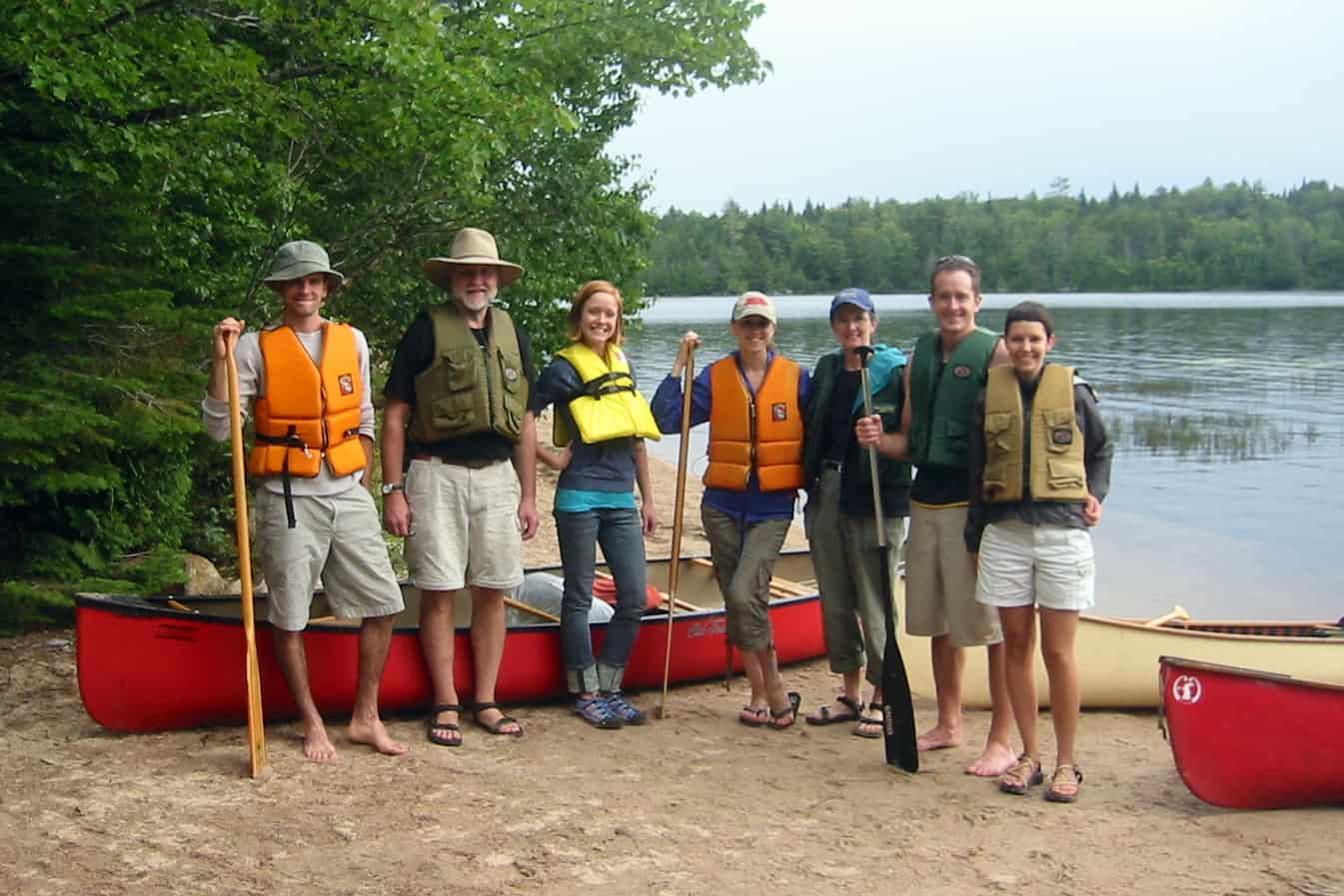
Closer to Home
This past July, after 40 years of serving as the founder and lead physician in the ministry, delivering over 1800 babies, caring for adults and children in hospital and intensive care units, and seeing countless patients in our offices, I’ve a “graduated into retirement“ and am now devoting myself full-time to my marriage and family as well as going deeper into study, prayer, and community service.
What has been left to the end of this narrative are any details about my adult family life. But family has been underneath and intimately woven through it all, both my family of origin and my family of destination. My mother and father have both passed, as well as all my grandparents and aunts and uncles, but I remain close with my brother and sister and their families even though they live on the West Coast. In what turned into a very sad chapter during my early adult life, I was married in medical school and residency to a young woman that I met in college, but we went our separate ways when I went through the crisis and transformation of my spiritual life that has been described above. When I became a dramatically converted Christian this furthered the distance that had been progressively developing between us while we were living together as counterculture hippies. We were unable to reconcile, and she relocated to New York City to find her own future while I sought God‘s provision for my life back in Rochester.
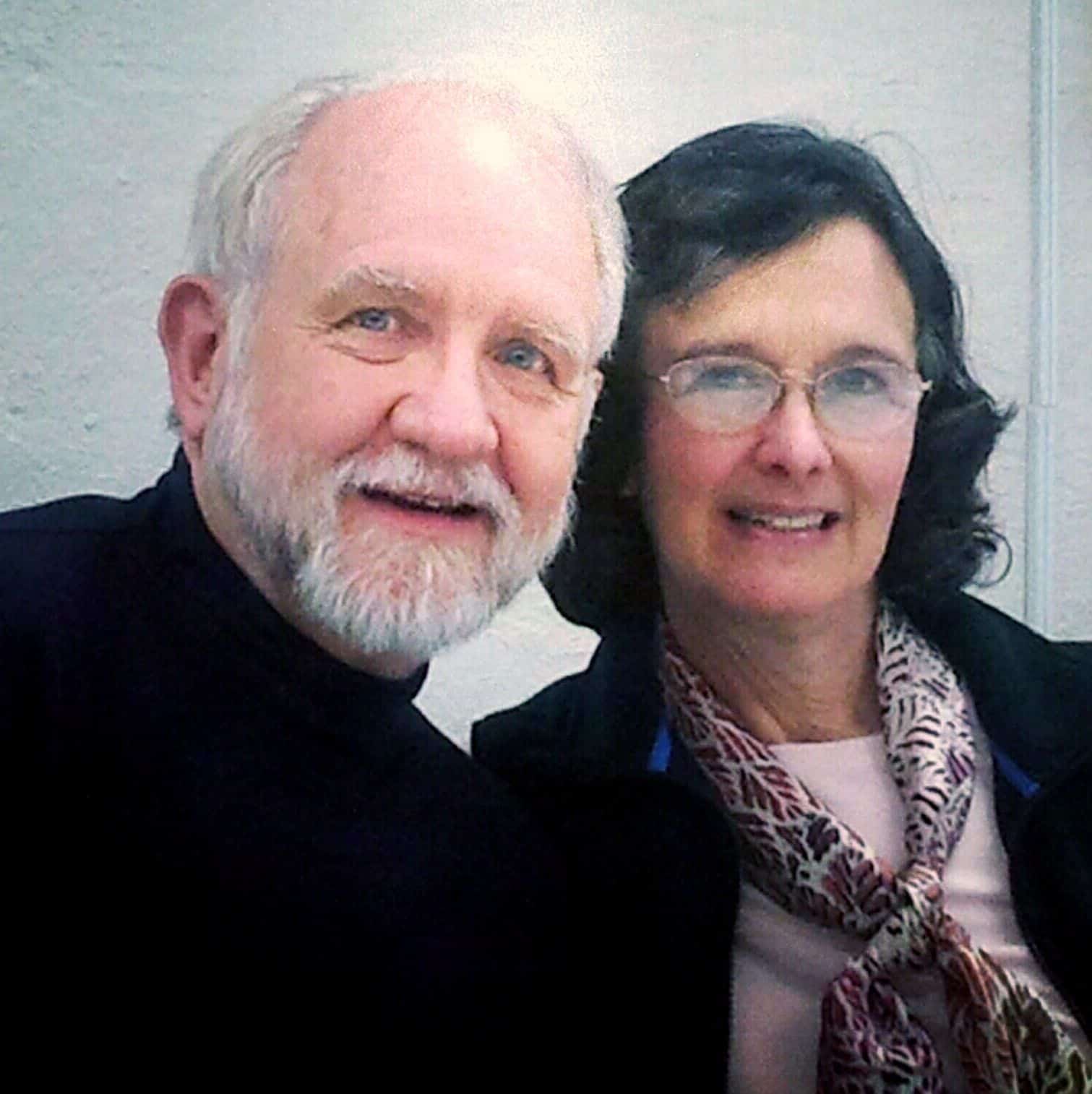
Then in 1975, by God’s amazing grace and in His matchless timing, I met and married the wonderful woman that I’ve been wedded to for the past 46 years! Since then Susan has not only been my wife but my best friend, confidant, lover, supporter and the mother of our four children – two sons and two daughters. She understands me and the call that we have on our lives together better than anyone else on the planet and has made a home with me where we raised our children together into adulthood as best we knew how. They are now wonderfully productive and engaging adults who are gracefully approaching middle-age and married to delightfully compatible partners.
Today we have eight grandchildren ranging in age from infancy to early adulthood and enjoy studying and praying together, serving the neighborhood and community around us, camping out, going skiing and canoeing, reading to one another, visiting family near and far, sharing His Good News, and reaching out to others as best we can wherever we go. To recount the adventures, misadventures, mistakes made, lessons learned, people we’ve met and loved, sacrifices we’ve made and joys received as offspring in our own families of origin and as spouses, parents, people on mission at home and abroad, and just plain living life in the ‘hood would take volumes. Oh, and did I mention the Atlantic, the Pacific, the Rockies, Susan’s harp, France, Zermatt, and our cabin in the woods?
The casual reader who doesn’t know us very well might get the impression from my narrative that my Christian life and our family life together have been one smooth, charmed road from my conversion onward. Anyone who understands human life, however, should know that we all make mistakes along the way, some more difficult than others. By God’s grace we live and learn through difficult trials how deeply our sin natures are woven into the fabric of our very being and how intentional we have to be to overcome and rise above them again. We learn to forgive and be forgiven, to love and love again, to weep and laugh and pray and start over. God is good. He covers us and helps us recover. When we fall, He is there to pick us up and show us new ways, His ways, of living life. He makes His Word come alive over and over and sends His Holy Spirit to correct, comfort, restore, and guide us every step of the way. We are eternally grateful for His love and grace and mercy.
It has been said that Aristotle divided human activities into three kinds: work, recreation, and leisure. The first is the employment that we devote ourselves to in sustaining our material lives and promoting the goals of the society around us. Recreation involves activities that we engage in for pleasure like sports, fun and games, sightseeing or recreational shopping, surfing the web, and playing in general. Leisure encompasses those activities we enter into for our own education, personal growth, and understanding of God and the world around us. Our sabbath rest, reading, meditation, and group activities aimed at “stimulating one another to faith and good works” are included in the latter. When I “graduated into retirement” in the summer of 2018, the time I had spent in work has been intentionally transferred almost entirely over to leisure in this sense, not to recreation or more gainful employment. And the focus of my guided meditations and studies has consistently been to apprehend and be more deeply apprehended by the Kingdom of God and His Righteousness. This website represents some of the early flowering of this transition, produced in the hope that fruit will come.
Our lives remain challenging but very full, and we are certain that the best is yet to come! Thanks for coming alongside our journey!
